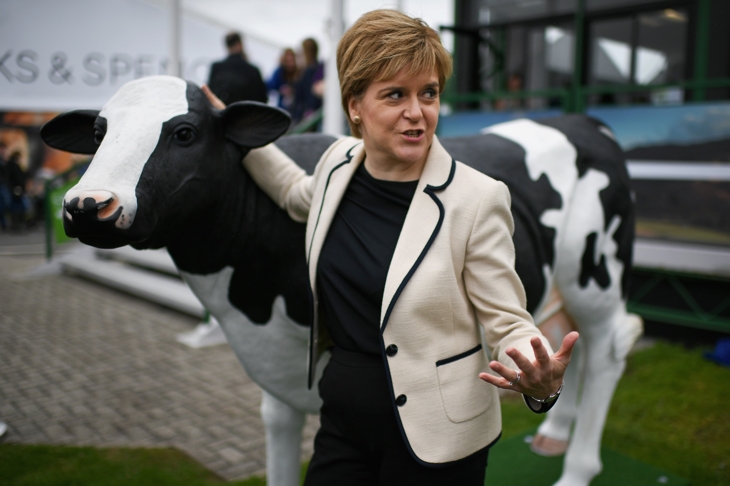Ever since the general election Nicola Sturgeon has lurked in her tent, contemplating the future. The result of that election, in which the SNP’s share of the vote fell by 13 points and in which it lost 21 seats, demanded a period of ‘reflection’ from the first minister. Where does Scotland stand now?
The answer, which was wearily predictable, is just where it stood before. Nicola Sturgeon emerged from her period of reflection yesterday with a simple message: nothing has changed.
Sure, she talked about ‘resetting’ her timetable for independence, confirming that she would not this year introduce a bill at the Scottish parliament seeking the Section 30 order from the Westminster parliament that would permit a referendum to be held legally. Sure, she allowed that there was now no prospect of a referendum on the timetable she had initially preferred: that is, by the end of next year.
But she did not ‘reset’ anything else. She did not ‘park’ IndyRef2, far less did she abandon it for the duration of this Scottish parliament. All that happened, despite the immediate suggestions to the contrary from a number of London-based journalists, was that she allowed for a six to 12-month delay in her preferred timetable.
Independence, and therefore a second referendum, remains on the table. Now is not quite the time but nothing else has changed.
This shift was in any case evident during the election campaign. At the SNP manifesto launch in Perth, Sturgeon admitted that a referendum might have to wait until after Brexit had been completed and not be held, as she had hoped, once the general terms of Brexit were clear.
Today’s statement just reiterates all of that. There has been no movement, no profound change of either heart or policy. Instead, the first minister insisted – as she has done for months – that the people of Scotland should have the right to determine their constitutional future all over again, taking into account the likely traumas of post-Brexit Britain.
What did change, as a result of the election result, however was the SNP’s ability to leverage the pro-independence majority at Holyrood – a majority confirmed by parliamentary vote earlier this year – into pressure on the UK government that would shame or coerce Theresa May’s government into allowing a second referendum. The election result stiffened Unionist spines. There will be no referendum unless something changes and unless the people of Scotland start demanding one. At present, there is little sign of that happening.
So, as is usually the case with the SNP, Sturgeon wanted to have it both ways, reassuring those hostile to a second plebiscite that there wouldn’t be one ‘now’ while encouraging the faithful to remember that there would be one in the fullness of time. Patience, people.
The difficulty is that the Unionist opposition isn’t buying it. See, they cry, nothing has changed! The first minister is carrying on regardless, indifferent and even hostile to public opinion. She isn’t listening. She can’t listen. She won’t listen. What part of No Means No does she not understand?
Brexit might, of course, change all that even if, at present, there is little sign of that happening. Sturgeon’s statement to parliament today was, then, provided a minor shift in timing and emphasis but no substantive change to policy.
That’s not kicking IndyRef2 into the long grass at all. It is, instead, more of much the same. Which is why some of the people happiest with Sturgeon’s statement were not found on the benches behind her but, rather, across the Holyrood chamber. Ruth Davidson was one of today’s winners too, you see.







Comments